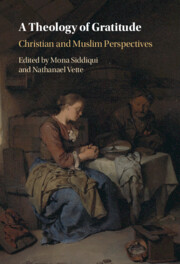48 results
Index
-
- Book:
- A Theology of Gratitude
- Published online:
- 16 December 2022
- Print publication:
- 22 December 2022, pp 202-210
-
- Chapter
- Export citation
Part III - Gratitude and Society
-
- Book:
- A Theology of Gratitude
- Published online:
- 16 December 2022
- Print publication:
- 22 December 2022, pp 125-193
-
- Chapter
- Export citation
Abbreviations
-
- Book:
- A Theology of Gratitude
- Published online:
- 16 December 2022
- Print publication:
- 22 December 2022, pp xxi-xxii
-
- Chapter
- Export citation
Part II - Gratitude and Humanity
-
- Book:
- A Theology of Gratitude
- Published online:
- 16 December 2022
- Print publication:
- 22 December 2022, pp 67-124
-
- Chapter
- Export citation
Copyright page
-
- Book:
- A Theology of Gratitude
- Published online:
- 16 December 2022
- Print publication:
- 22 December 2022, pp vi-vi
-
- Chapter
- Export citation
Preface
-
-
- Book:
- A Theology of Gratitude
- Published online:
- 16 December 2022
- Print publication:
- 22 December 2022, pp xv-xx
-
- Chapter
- Export citation
Contents
-
- Book:
- A Theology of Gratitude
- Published online:
- 16 December 2022
- Print publication:
- 22 December 2022, pp vii-viii
-
- Chapter
- Export citation
Select Bibliography
-
- Book:
- A Theology of Gratitude
- Published online:
- 16 December 2022
- Print publication:
- 22 December 2022, pp 194-201
-
- Chapter
- Export citation
Contributors
-
- Book:
- A Theology of Gratitude
- Published online:
- 16 December 2022
- Print publication:
- 22 December 2022, pp ix-x
-
- Chapter
- Export citation
Reviews
-
- Book:
- A Theology of Gratitude
- Published online:
- 16 December 2022
- Print publication:
- 22 December 2022, pp i-ii
-
- Chapter
- Export citation
Chapter 9 - From Resentment to Gratitude
- from Part III - Gratitude and Society
-
-
- Book:
- A Theology of Gratitude
- Published online:
- 16 December 2022
- Print publication:
- 22 December 2022, pp 127-138
-
- Chapter
- Export citation
Part I - Gratitude and God
-
- Book:
- A Theology of Gratitude
- Published online:
- 16 December 2022
- Print publication:
- 22 December 2022, pp 1-66
-
- Chapter
- Export citation

A Theology of Gratitude
- Christian and Muslim Perspectives
-
- Published online:
- 16 December 2022
- Print publication:
- 22 December 2022
Belonging in Exile: James Baldwin in Paris
-
- Journal:
- Journal of Law and Religion / Volume 37 / Issue 2 / May 2022
- Published online by Cambridge University Press:
- 30 May 2022, pp. 244-249
- Print publication:
- May 2022
-
- Article
- Export citation
Notes on Text
-
- Book:
- Human Struggle
- Published online:
- 11 February 2021
- Print publication:
- 04 March 2021, pp x-x
-
- Chapter
- Export citation
Copyright page
-
- Book:
- Human Struggle
- Published online:
- 11 February 2021
- Print publication:
- 04 March 2021, pp iv-iv
-
- Chapter
- Export citation
Epilogue
-
- Book:
- Human Struggle
- Published online:
- 11 February 2021
- Print publication:
- 04 March 2021, pp 195-197
-
- Chapter
- Export citation
Bibliography
-
- Book:
- Human Struggle
- Published online:
- 11 February 2021
- Print publication:
- 04 March 2021, pp 198-208
-
- Chapter
- Export citation
Contents
-
- Book:
- Human Struggle
- Published online:
- 11 February 2021
- Print publication:
- 04 March 2021, pp vii-vii
-
- Chapter
- Export citation
4 - Contemporary Islam and the Struggle for Beauty
-
- Book:
- Human Struggle
- Published online:
- 11 February 2021
- Print publication:
- 04 March 2021, pp 139-156
-
- Chapter
- Export citation

